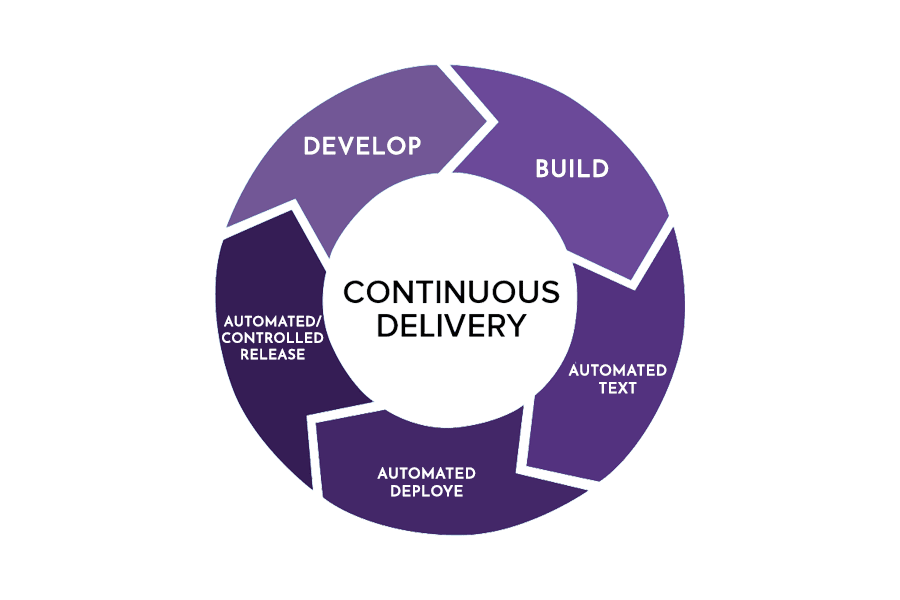DevOps is a methodology proposing a set of ideal principles and practices. The tools, or rather the toolchain, are only intended to support the essential practice of the process. Ultimately, the tools don’t matter because today’s DevOps toolchains are very different than they were two years before and will be very different in the next two years. But what matters is a sound understanding of the basic principles and practices of DevOps.
This article will elaborate on why businesses should prefer Azure DevOps services and Azure engineers instead of any other to accelerate business growth.
5 reasons to use Azure DevOps services
Here are 5 reasons to use Azure DevOps services which are as follows:
1. Continuous Integration and Delivery
Continuous integration (CI) is a software development practice where Azure DevOps developers regularly merge their code changes into a central repository, after which automated builds and tests are run. The key goals of CI are to find and address bugs more quickly, improve software quality, and reduce the time it takes to validate and release new software updates.
Continuous integration focuses more on smaller commits and more minor code changes to integrate. A developer commits code at regular intervals, at minimum once a day. Then, the developer pulls code from the repository to ensure the code on the local host is merged before pushing it to the build server.

5 Reasons to use Azure DevOps
2. Standardized Development
” Azure DevOps: For once, a magic silver bullet “
Azure DevOps teams focus on standardizing development environments and automating delivery processes to improve delivery predictability, efficiency, security, and maintainability. These are the core features of Azure DevOps, which give developers more control of the production environment and a better understanding of the production infrastructure.
3. Infrastructure as Code
The Human brain is a little bad at repetitive tasks. Still, on the other hand, Infrastructure as code (IaC) is the prerequisite for standard DevOps practices such as version control, code review, continuous integration, and automated testing. It consists of managing and provisioning computing infrastructure (containers, virtual machines, physical machines, software installation, etc.) and their configuration through machine-processable definition files or scripts rather than using interactive configuration tools and manual commands.

Infrastructure as Code
4. The Management Credo
Here the basic question arises: what are the sinews of war of IT Management? Or in other words, we can say that, when it comes to Software Development Projects, what does management want foremost? Any ideas?
That term is Improve Time to Market Resolution (TTM); of course, The Time to Market Resolution or TTM is the total length of period it takes from an idea generation to processing and execution and then its availability to end-users or for sale to customers. TTM is vital in industries where products are outmoded quickly.
An IT organization or department is measured on two key Performance Indicators (KPIs)
- The quality of the software, where the target is to have the minimum errors possible and
- TTM, where the target is to go from business ideas (often given by business users) to production – making the feature available to users or customers – as soon as possible.
5. Time to Market Resolution (TTM)
In software engineering, where approaches, businesses, and technologies change almost yearly, the TTM is an essential KPI (Key Performance Indicator) and is often called Lead Time. Azure DevOps has a key feature of bringing the product into the market even before the expected time because of its automation and continuous delivery.
6. Challenge
The problem that arises here is that most often, these two distinct objectives are supported by two different working teams, which are the development teams and the operations teams, which are responsible for running software. The easy solution to that problem is the adoption of Azure DevOps. Azure DevOps will bring these two teams together just like a bond.
Azure Products:
My favorite part of Azure DevOps is Azure DevOps Boards and Backlog management features which are focused on end-to-end product development, from the requirement to deployment and support. Other major Azure DevOps products include Azure Repos, Azure Pipelines, Azure Test Plans, and Azure Artifacts.
Kloudeo Provides standardized Azure DevOps services delivered by certified Azure DevOps engineers and consultants who never compromise on quality. The central focus is always on standard product delivery.
Conclusion
The Businesses must move towards Microsoft-certified Azure DevOps services for quality product delivery, which will improve your growth and lead the market with new and innovative ideas built with Azure DevOps by Kloudeo. Discuss your Azure DevOps Projects with Certified Engineers.




